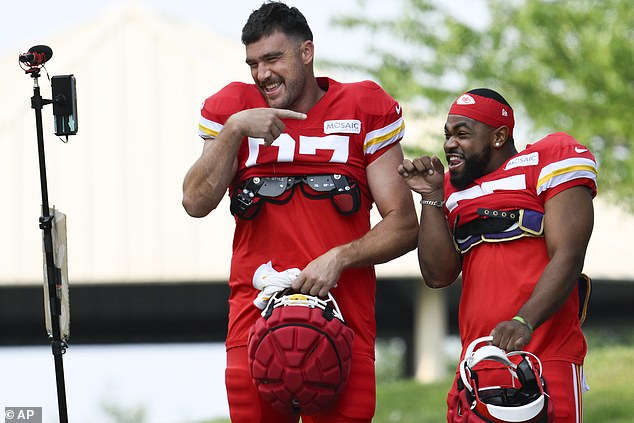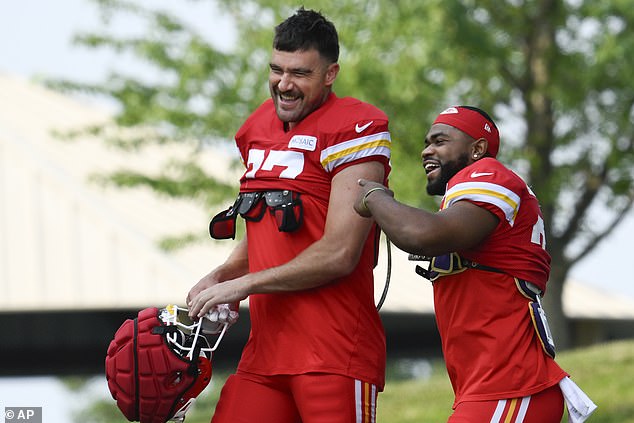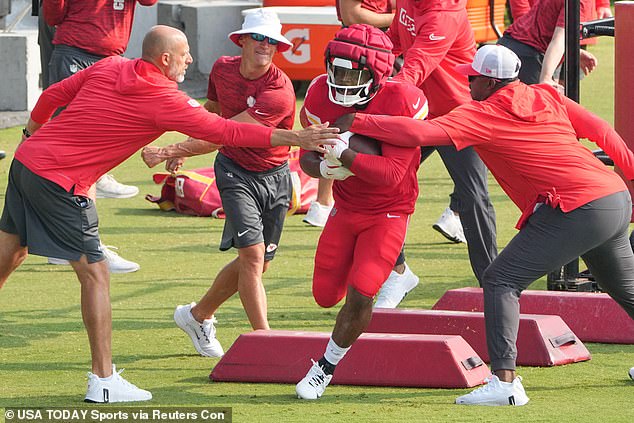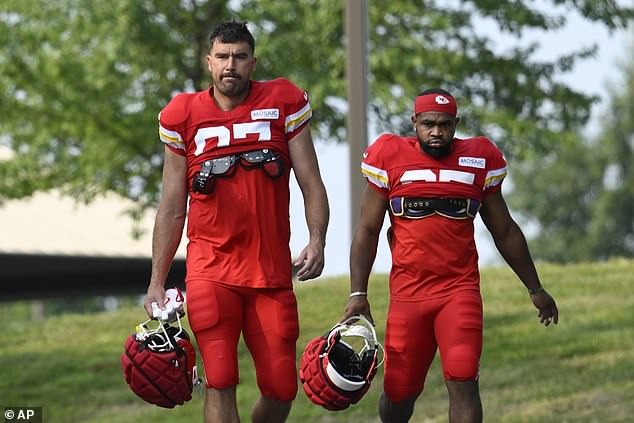Kansas City Chiefs teammate Clyde Edwards-Helaire has credited Travis Kelce with helping him deal with post-traumatic stress disorder (PTSD), years after an 18-year-old was shot and killed while allegedly trying to rob him at gunpoint.
The incident occurred in Baton Rouge, Louisiana, in December 2018, when Edwards-Helaire and then-LSU teammate Jared Small were attempting to sell an electronic item.
Kobe Johnson was the teenager who died, and police have never said who fired the fatal shot. But the repercussions of that day are still being felt by Edwards-Helaire, who has missed practice recently because of post-traumatic stress disorder.
Speaking this week, Edwards-Helaire discussed how Kelce has been keeping a close eye on him during Kansas City’s practice camp for the upcoming NFL season.
‘It’s just, really, I’m not there mentally. And it’s one of those things where, early on, the guys who are paying attention, Trav (Travis Kelce), Kadarius (Toney) sometimes, they can even tell beforehand (that he’s going through a tough time). Like, ‘Well, Clyde might not be, he’s not laughing, he’s not laughing, he’s not himself.’
Travis Kelce has been helping Clyde Edwards-Helaire deal with post-traumatic stress disorder (PTSD).

Edwards-Helaire spoke of Kelce’s influence as he bravely opened up about his ordeal.
He added that Kelce and Toney said, “We just have to make sure we’re evaluating him as a person, not just the energy giver, the guy who makes people laugh (or) the guy who keeps the locker room going.”
Edwards-Helaire said this week that “a defensive situation” on December 22, 2018 is the beginning of his problems.
“I would say that’s probably where most things come from, but I wouldn’t necessarily say everything comes from there,” the 25-year-old explained.
‘I have best friends who passed away at a young age from gun violence and just not being in the right place at the right time and just knowing that I have people close to me or around me that could be in the same situation as me.
“During my early years, you just try to block everything out and think, ‘Oh, I’ll get over it at some point.’ And you start to realize that just doesn’t happen.
“You get older and you realize that no matter the age, the person, or the situation, we all need help at some point.” It takes courage to talk about it, and having PTSD and dealing with it once people bring it up, it’s not something I always want to talk about.
‘I never really know how my body or mind will react, it’s something I can’t really pinpoint or know exactly what’s going to happen.
‘I feel like it’s an important thing to speak out, but I’m just getting over that personal hurdle, being able to honestly know that we all go through good and bad things. It’s a stepping stone. I’m only 25 and I’m trying to live the rest of my life in a healthy way.
“Sometimes I’m admitted to the hospital and I can’t stop vomiting. There’s nothing that can stop it. I’m very dehydrated, I’m losing weight very quickly, but mentally I feel very bad for not being there.”

Kelce and Edwards-Helaire pictured together at Chiefs practice earlier in the week.

Edwards-Helaire and the Chiefs aim for a historic Super Bowl three-peat next season
Edwards-Helaire also tweeted about dealing with PTSD earlier this week, saying: ‘Living with PTSD is no small feat, it’s difficult and very overwhelming.
‘Over the past month I’ve had a lot of flare-ups and the amazing staff here at #Chiefs have been helping me through some tough times.
‘I’ll be back on track at the next training session! With love, Glydro.’
The Chiefs begin the upcoming NFL season on September 5 against the Baltimore Ravens at Arrowhead Stadium in Kansas City.
Edwards-Helaire and his team are preparing for a historic opportunity to earn a third consecutive Super Bowl victory.


